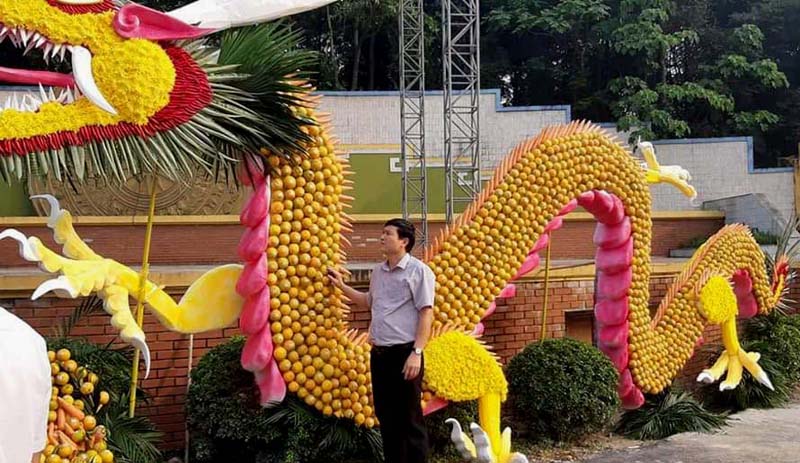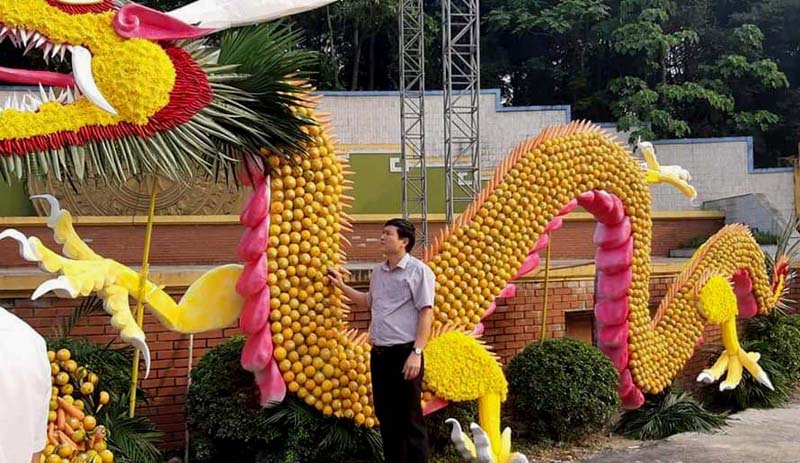
HBO - On the occasion of Hung King's death anniversary in 2019, from 29th-30th March, in Phu Tho province, The National Fund For Vietnamese Children cooperates with Vietnam Association of Small and Medium Enterprises to organize the program "Incense offering ceremony of Hung Kings - Entrepreneurs and community for Vietnamese children”.

The dragon figure made from Cao Phong oranges is
present at the event stage at Hung Temple Relic Area, Phu Tho province.
To attend the program, there are Senior
representatives from the Presidential Office; Ministry of Labor, Invalids and
Social Affairs; ministries, branches and agencies at the central and local
levels, together with more than 300 domestic entrepreneurs and enterprises. Hoa
Binh province has nearly 100 entrepreneurs attending. Of which, there are 20
entrepreneurs and cooperative managers representing for more than 80
enterprises and cooperatives of Cao Phong district.
Hoa Binh province has left a deep and good
impression not only by the large force participating in the event, but also by
a series of remarkable activities. Especially 2 dragons made from Cao Phong
oranges are presented in the stage of the event. In the incense offering
ceremony of Hung Kings, there is the presence of gongs imbued with unique
cultural identities of Muong gongs, Hoa Binh.
Cao Phong district has planted Mangifera
foetidas in the relic area and offered the National Festival fruit tray,
including local citrus products to express the respect, showing the desire that
specialty Cao Phong oranges shall become the orange offered to Kings. This is
an opportunity for Cao Phong district to broadcast, introduce and promote trade
for oranges of the district.
Cam Le
According to data from the Hoa Binh Provincial Party Committee, the industrial production index for the first six months of 2025 is estimated to have increased by 20% compared to the same period last year. This marks the highest year-on-year growth rate for this period since 2020.
In the first six months of 2025, Hoa Binh province’s export turnover was estimated at 1.145 billion USD, marking an 18.11% increase compared to the same period in 2024. Import turnover was estimated at $ 804 million, a 17.15% increase, which helped the province maintain a positive trade balance.
The lives of the ethnic minority farmers in Tan Lac district have gradually improved thanks to the new directions in agricultural production. This is a testament to the collective strength fostered through the professional associations and groups implemented by various levels of the district’s Farmers’ Union.
With the motto the "product quality comes first,” after nearly one year of establishment and operation, Muong village’s Clean Food Agricultural and Commercial Cooperative, located in Cau Hamlet, Hung Son Commune (Kim Boi district), has launched reputable, high-quality agricultural products to the market that are well-received by consumers. The products such as Muong village’s pork sausage, salt-cured chicken, and salt-cured pork hocks have gradually carved out a place in the market and they are on the path to obtaining the OCOP certification.
In the past, the phrase "bumper harvest, rock-bottom prices" was a familiar refrain for Vietnamese farmers engaged in fragmented, small-scale agriculture. But today, a new spirit is emerging across rural areas of Hoa Binh province - one of collaboration, organisation, and collective economic models that provide a stable foundation for production.
Maintaining growing area codes and packing facility codes in accordance with regulations is a mandatory requirement for agricultural products to be eligible for export. Recently, the Department of Agriculture and Environment of Hoa Binh province has intensified technical supervision of designated farming areas and packing facilities to safeguard the "green passport" that enables its products to access international markets.



